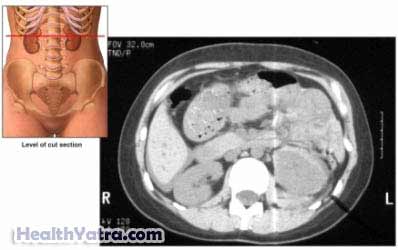Definition
A CT scan is a type of x-ray. It uses a computer to make pictures of the inside of the body. In this case, images of the abdomen are taken.

Reasons for Test
A CT scan is done to study the organs and tissue in your abdomen. Your doctor will look for signs of:
- Injury
- Tumors
- Infections
- Other diseases
Your doctor may recommend an abdominal CT scan if you have the following symptoms:
- Abdominal pain
- Bowel changes
- Blood in urine or stool
- Urinary difficulties
- Jaundice (yellow skin)
- Weight loss
- Unexplained fever
- Abdominal injury
- Fluid buildup in the abdomen
Possible Complications
Sometimes a chemical called contrast is used to help improve the pictures. Complications with contrast are rare but some can have an allergic reaction or kidney problems.
A CT scan does use radiation. You and your doctor will weigh the harms and benefits of this test. A CT scan may not be advised if you are pregnant.
Be sure to discuss these risks with your doctor before the test.
What to Expect
Prior to Test
Your doctor may tell you to:
- Avoid eating or drinking anything for four hours before the test if contrast will be used.
- Remove any metal objects, such as jewelry, hearing aids, or dentures..
Description of the Test
Sometimes contrast is necessary. It helps make certain organs and tissue easier to see in pictures. It is often given by mouth in a drink. Other times, it will be injected into a vein. Other times it is delivered by an enema.
You will be positioned on a special moving table. The table will move slowly through the CT scanner. You will need to stay still during the entire test. As the scanner takes pictures, you will hear humming and clicking. The technician will ask you to hold your breath at certain points. This will help get a clear picture. You will be able to talk to the technician with an intercom.
After Test
If you had contrast, you may be told to drink extra fluid. This will flush the contrast from your body.
How Long Will It Take?
About 30 minutes
Will It Hurt?
You may feel flushed if you received contrast. You may notice a salty or metallic taste in your mouth. You may also feel nauseated.
Results
The CT images will be sent to a radiologist who will analyze them. Your doctor will receive the results and discuss them with you.
Call Your Doctor
If you are given contrast, call your doctor if any of the following occurs after the test:
- Hives
- Itching
- Nausea
- Swollen, itchy eyes
- Tightness of throat
- Difficulty breathing
In case of an emergency, call for medical help right away.
